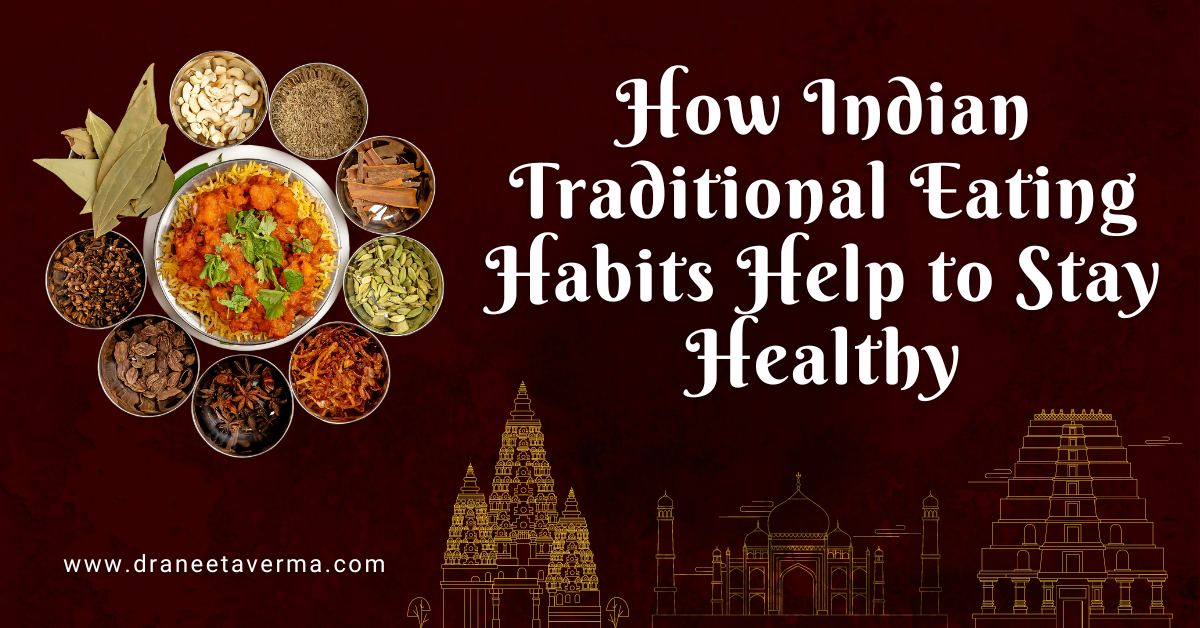+918048051883

This is your website preview.
Currently it only shows your basic business info. Start adding relevant business details such as description, images and products or services to gain your customers attention by using Boost 360 android app / iOS App / web portal.
How Indian Traditional Eating Habits Help to St...

How Indian Traditional Eating Habits Help to Stay Healthy India's rich and diverse cultural history has gifted its people with a variety of traditional practices, particularly in food habits. These age-old customs are not only deeply rooted in social and religious contexts but also offer immense health benefits. Modern science increasingly recognizes the wisdom embedded in these practices, as they contribute to balanced nutrition, digestive health, and overall well-being. Let’s delve into some key aspects of Indian traditional eating habits and their benefits. 1. Diversity in Diet Indian traditional meals are incredibly diverse, incorporating grains, legumes, vegetables, fruits, spices, and herbs in a balanced manner. The principle of variety ensures that the body receives a wide spectrum of nutrients. Traditional meals often include: - Whole grains like rice, wheat, millets, and barley, providing a rich source of fiber, vitamins, and minerals. - Legumes and pulses such as lentils (dal), chickpeas, and beans, which are high in protein and fiber. - A wide range of seasonal vegetables and fruits, offering antioxidants, vitamins, and essential minerals. This diversity ensures a well-rounded nutritional intake that promotes long-term health and reduces the risk of chronic diseases like diabetes and heart conditions. 2. Ayurvedic Wisdom: Eating According to Doshas Ayurveda, India’s ancient system of medicine, emphasizes the importance of eating according to one’s dosha (body constitution) – Vata, Pitta, or Kapha. This personalized approach to food ensures that individuals consume meals that balance their internal energies, improving digestion, enhancing immunity, and promoting mental clarity. Ayurvedic principles encourage: - Eating warm, cooked food for better digestion. - Using digestive spices like cumin, turmeric, ginger, and coriander to enhance metabolism. - Consuming meals at regular intervals and avoiding overeating. By following these guidelines, one can maintain optimal health and prevent lifestyle-related disorders. 3. Mindful Eating: The Tradition of Gratitude Indian culture traditionally encourages mindfulness while eating. The act of saying a prayer or offering gratitude before meals is a common practice in many households. This simple habit fosters mindfulness, helping individuals focus on their food and eat slowly. Mindful eating leads to better digestion, as people tend to chew their food thoroughly and listen to their body’s hunger and satiety signals, preventing overeating. 4. Importance of Spices and Herbs Indian cuisine is known for its extensive use of spices and herbs, many of which have medicinal properties. Key spices like turmeric, cumin, coriander, fennel, and ginger are known to aid digestion, reduce inflammation, and boost immunity. - Turmeric contains curcumin, a powerful anti-inflammatory and antioxidant compound that helps in reducing inflammation and improving brain function. - Cumin and fennel seeds are known for their ability to stimulate digestion and alleviate bloating or indigestion. - Coriander helps to cool the body and has detoxifying properties. These spices not only enhance the flavor of food but also contribute significantly to physical health. 5. Ghee: The Traditional Superfood Ghee, or clarified butter, has been an integral part of Indian diets for centuries. While modern dietary trends often shun fats, ghee remains a celebrated ingredient in Indian households for its numerous health benefits: - It contains healthy fats that are essential for brain function and hormone regulation. - Ghee is rich in butyrate, a fatty acid that supports gut health and digestion. - It has anti-inflammatory properties and supports the absorption of fat-soluble vitamins such as A, D, E, and K. In moderate amounts, ghee can promote heart health, improve energy levels, and enhance overall wellness. 6. Fermented Foods: Probiotics for Gut Health Fermented foods such as curd (yogurt), pickles, idli, dosa, and kanji have long been a staple of traditional Indian diets. These foods are rich in probiotics, which help balance the gut microbiome, enhance digestion, and improve immunity. - Curd provides beneficial bacteria that aid in digestion and help prevent infections. - Idli and dosa, made from fermented rice and lentil batter, are rich in probiotics and easily digestible. A healthy gut is key to overall wellness, as it influences everything from digestion to mental health. 7. Seasonal and Local Eating Traditional diets emphasize eating seasonal and local foods, which naturally align with the body’s needs, promoting better health and immunity. 8. Balanced Thali The Indian thali offers a balanced meal with grains, protein, vegetables, and small portions of chutneys or sweets, ensuring all essential nutrients are included. Incorporating these timeless habits into modern life can lead to better health, improved digestion, and a balanced lifestyle, echoing the ancient wisdom of Indian

